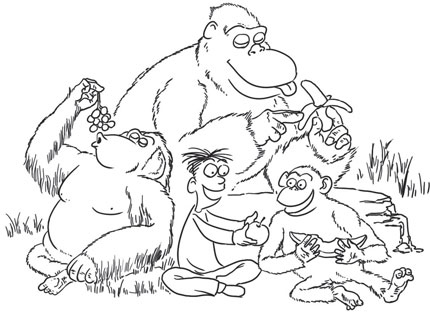Bridging moral gulf between man and ape
- By Peter Singer
 0 Comment(s)
0 Comment(s) Print
Print E-mail
Shanghai Daily, August 16, 2011
E-mail
Shanghai Daily, August 16, 2011
 |
|
[By Zhou Tao/Shanghai Daily] |
Two new movies - one a science-fiction blockbuster, the other a revealing documentary - raise the issue of our relations with our closest non-human relatives, the great apes. Both dramatize insights and lessons that should not be ignored.
Rupert Wyatt's "Rise of the Planet of the Apes" is the seventh film in a series based on Pierre Boule's 1963 novel, "Planet of the Apes," about a world populated by highly intelligent simians. Publicity for the new film claims that it is "the first live-action film in the history of movies to star, and be told from the point of view of, a sentient animal." Yet no live apes were used.
Instead, "performance capture technology," originally invented for the movie "Avatar," enables a human actor, Andy Serkis, to play the role of the chimpanzee Caesar, not by dressing in a chimp suit, but by having every gesture and facial movement, even the twitch of an eyebrow, transformed into the movement of an ape.
When I spoke with Wyatt last month, he acknowledged that there were practical reasons for not using real apes in his movie. But he also understood the ethical issue.
"There are things I didn't want to be involved in," he told me. "To get apes to do anything you want them to do, you have to dominate them; you have to manipulate them into performing. That's exploitative."
Wyatt's reluctance to join in the exploitation of great apes is understandable, given that the film itself tells the story of apes rising up in response to oppression from dominant humans. The central human character, Will Rodman (played by James Franco), is a scientist seeking a cure for Alzheimer's disease who experiments on apes.
Cold-blooded scientist
Many films would have glorified a scientist seeking such a goal, and treated the use of animals for that purpose as obviously justified. "Rise of the Planet of the Apes," however, portrays Rodman as, in Franco's words, "a cold, isolated person." Only when Rodman's superiors cancel his experiments and he takes home Caesar, an infant chimpanzee, does the scientist begin to care about others.
The plot then takes another turn when Caesar becomes too big and aggressive to live in a human home, and is taken to what is supposed to be a primate sanctuary, but is in fact a dumping ground for unwanted apes, run by humans who display cruelty to the captive animals.
As far as the treatment of apes is concerned, much of the film is firmly grounded in reality, as a viewing of "Project Nim," a documentary based on Elizabeth Hess's book "Nim Chimpsky: The Chimp Who Would be Human," clearly demonstrates. Nim was born in 1973, in a primate research facility in Oklahoma, and was taken from his mother when he was only 10 days old, to be used in a sign-language experiment.
Reared as part of a human family, he learned to use more than 100 signs from American Sign Language, the language used by hearing-impaired Americans. But he was taken from his first human family and handed over to other teachers with whom he did not have the same kind of bond. He grew stronger and more aggressive and began biting his teachers.
Herbert Terrace, the Columbia University psychologist who was directing the project, decided to end it and sent Nim back to the primate facility in Oklahoma. There, the pampered chimpanzee - who, when asked to sort photos of humans and apes, put his own photo among the humans - was locked in a cage with other chimps. He demonstrated his view of that situation by signing "out" to passing humans.
Nim suffered various other vicissitudes - and narrowly escaped being infected with hepatitis as part of a medical experiment - until he was eventually released to an animal sanctuary, where he died in 2000.
In 1993, Paola Cavalieri and I founded The Great Ape Project, an organization dedicated to the idea of recognizing that great apes have a moral status befitting their nature as self-aware beings who are capable of thought and have rich and deep emotional lives.
At a minimum, they should have the rights to life, liberty, and protection from torture that we grant to all members of our own species, regardless of their intellectual abilities.
In the intervening years, that idea has made steady progress. Perhaps the release of these two very different films will lead to a further push to bring great apes within the circle of beings with moral and legal rights. In that way, our closest relatives could serve to bridge the moral gulf that we have dug between ourselves and other animals.
Peter Singer is professor of bioethics at Princeton University and laureate professor at the University of Melbourne. His books include "Animal Liberation," "Practical Ethics," "The Ethics of What We Eat," and "The Life You Can Save." Copyright: Project Syndicate, 2011.www.project-syndicate.org. Shanghai Daily condensed the article.





